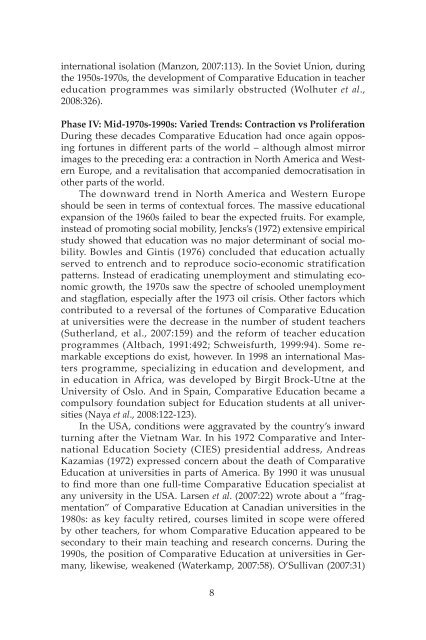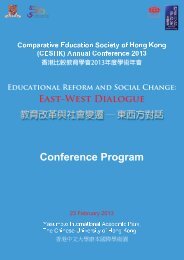Comparative Education Bulletin - Faculty of Education - The ...
Comparative Education Bulletin - Faculty of Education - The ...
Comparative Education Bulletin - Faculty of Education - The ...
You also want an ePaper? Increase the reach of your titles
YUMPU automatically turns print PDFs into web optimized ePapers that Google loves.
international isolation (Manzon, 2007:113). In the Soviet Union, during<br />
the 1950s-1970s, the development <strong>of</strong> <strong>Comparative</strong> <strong>Education</strong> in teacher<br />
education programmes was similarly obstructed (Wolhuter et al.,<br />
2008:326).<br />
Phase IV: Mid-1970s-1990s: Varied Trends: Contraction vs Proliferation<br />
During these decades <strong>Comparative</strong> <strong>Education</strong> had once again opposing<br />
fortunes in different parts <strong>of</strong> the world – although almost mirror<br />
images to the preceding era: a contraction in North America and Western<br />
Europe, and a revitalisation that accompanied democratisation in<br />
other parts <strong>of</strong> the world.<br />
<strong>The</strong> downward trend in North America and Western Europe<br />
should be seen in terms <strong>of</strong> contextual forces. <strong>The</strong> massive educational<br />
expansion <strong>of</strong> the 1960s failed to bear the expected fruits. For example,<br />
instead <strong>of</strong> promoting social mobility, Jencks’s (1972) extensive empirical<br />
study showed that education was no major determinant <strong>of</strong> social mobility.<br />
Bowles and Gintis (1976) concluded that education actually<br />
served to entrench and to reproduce socio-economic stratification<br />
patterns. Instead <strong>of</strong> eradicating unemployment and stimulating economic<br />
growth, the 1970s saw the spectre <strong>of</strong> schooled unemployment<br />
and stagflation, especially after the 1973 oil crisis. Other factors which<br />
contributed to a reversal <strong>of</strong> the fortunes <strong>of</strong> <strong>Comparative</strong> <strong>Education</strong><br />
at universities were the decrease in the number <strong>of</strong> student teachers<br />
(Sutherland, et al., 2007:159) and the reform <strong>of</strong> teacher education<br />
programmes (Altbach, 1991:492; Schweisfurth, 1999:94). Some remarkable<br />
exceptions do exist, however. In 1998 an international Masters<br />
programme, specializing in education and development, and<br />
in education in Africa, was developed by Birgit Brock-Utne at the<br />
University <strong>of</strong> Oslo. And in Spain, <strong>Comparative</strong> <strong>Education</strong> became a<br />
compulsory foundation subject for <strong>Education</strong> students at all universities<br />
(Naya et al., 2008:122-123).<br />
In the USA, conditions were aggravated by the country’s inward<br />
turning after the Vietnam War. In his 1972 <strong>Comparative</strong> and International<br />
<strong>Education</strong> Society (CIES) presidential address, Andreas<br />
Kazamias (1972) expressed concern about the death <strong>of</strong> <strong>Comparative</strong><br />
<strong>Education</strong> at universities in parts <strong>of</strong> America. By 1990 it was unusual<br />
to find more than one full-time <strong>Comparative</strong> <strong>Education</strong> specialist at<br />
any university in the USA. Larsen et al. (2007:22) wrote about a “fragmentation”<br />
<strong>of</strong> <strong>Comparative</strong> <strong>Education</strong> at Canadian universities in the<br />
1980s: as key faculty retired, courses limited in scope were <strong>of</strong>fered<br />
by other teachers, for whom <strong>Comparative</strong> <strong>Education</strong> appeared to be<br />
secondary to their main teaching and research concerns. During the<br />
1990s, the position <strong>of</strong> <strong>Comparative</strong> <strong>Education</strong> at universities in Germany,<br />
likewise, weakened (Waterkamp, 2007:58). O’Sullivan (2007:31)<br />
8
















